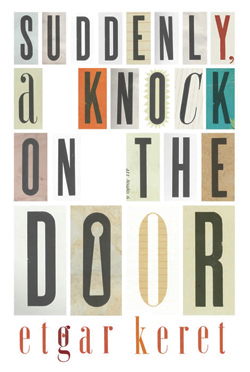Critically renowned Israeli author Etgar Keret released another collection of short stories titled “Suddenly, a Knock at the Door” that fans will laud over for weeks. This is the fifth collection of short stories released in the United States by Keret, translated from Hebrew, and shows that even the most overused cliché can open a door to a world full of possibilities and strange people that make a story unique and life-like.
Keret has been publishing short stories since 1992, co-authoring some graphic novels released in Israel and working for the Israel film and television industry. Keret didn’t gain world recognition until 2004 when a collection of short stories (“The Bus Driver Who Wanted to be God and Other Short Stories”) was released in the U.S. Now his stories can be found in The New Yorker, The New York Times and featured on NPR’s “This American Life.” His stories have also been portrayed in graphic novels and his novella “Kneller’s Happy Campers,” which was adapted into the independent movie, Wristcutters: A Love Story starring Patrick Fugit and Tom Waits (it premiered at the Sundance Film Festival). Keret has won prestigious writing awards including being named a Chevalier of France’s Order of Arts and Letters.
Upon first view of the book, many fans may notice the difference in thickness and weight; it’s much bigger than his previous releases. This is a very good thing for the fans that want longer stories and more to read in one collection. With 35 stories offered that range from a single paragraph to over 20 pages long, any fan of short stories should be thrilled with this release. They are silly but mature, find the ordinary in the weird, or suggest a unique view of this violent, cruel world. Keret switches hats constantly but his characters never leave the restraints of everyday life, only subtle differences explain their existence or give their purpose in life.
The first story shares its title with the book as the writer sets the tone for the rest of the collection. The main character in the story is pressured to tell a story by a Swedish tourist holding a gun, till “Suddenly, a knock on the door.” Eventually the main character’s couch is occupied by three strangers demanding a story as they threaten him with guns and a cleaver. He keeps trying with the same tired saying, “Suddenly, a knock on the door” but the strangers think it’s a cop-out, but they finally agree, “Just so long as it brings us a story.” It’s a simple device that writers use, but Keret shows how life interrupts our days or keeps it moving with a simple knock on the door.
The next story, “Lieland,” is possibly the best tale found in this collection, as well as a favorite that will stick out above the author’s author’s past works. It is as if Keret was stretching his hands in the first story, clearing his throat, and wants the audience to be hooked by the second story. Robbie, the main character of “Lieland,” is a professional liar that has made up an aunt who is first stricken with cancer so he can get out of school, and then plagued with blindness, to excuse his behavior in the military. Pretty soon Robbie finds himself in an empty world next to a gumball machine, and a redheaded boy missing his front tooth. The boy kicks Robbie in the shins and proclaims, “I’m your first lie.”
Robbie is dumbfounded but keeps wandering around the strange world until he meets Igor, a Russian with a glass eye and no arms. Igor, a skinny German Shepard with two paralyzed legs, is a little white lie Robbie made up when he was late to work. Robbie is traumatized by the experience and starts to change his ways, first telling innocent lies where nobody’s hurt, and then giving up lies altogether. The conclusion to the story will warm the cold-hearted and make readers question the kinds of lies they come up with.
In “One Step Beyond,” Keret again finds himself in the mind of a hired killer like his story “Good Intentions,” found in “Bus Driver,” except this murderer is without a conscience or morals. The main character is not given a name, but he is a man sitting on death row waiting to be executed. He says he could kill anybody, from old people to little kids, so long as he gets the job done and nothing bothers him. What he hates the most about children are kids stories, “…illustrated lies about worlds without evil, places more boring than death.”
The deathrow inmate can hardly wait for his death and ponders what the afterlife has in store for him. He asks for a Christian priest to talk to so the murderer can adequately prepare for what waits for him on the other side, but he’s ready to kill again no matter what it is. “It won’t matter to me if the guy’s a runof- the-mill sinner, or a demon, or Satan himself.” What happens to the serial killer after his execution can’t be revealed, but the personal hell the man finds himself in will give readers a hearty laugh that’ll make them want to share the story with friends and family.
This collection is the best Keret has released yet. The stories are filled with awkward occurrences and relatable characters that make readers yearn to live or scared for what’s outside their front door. These tales all seem connected with each other, as one story ends about a talkative man on a plane and the next story finds the main character on a plane fearing it’s going to crash. Keret exposes and blends his literary influences of Vonnegut and Kafka but cultivates stories that are all his own, rich with humanity, humor and spontaneity that comes with a knock at the door.
IMAGE TAKEN from jewishbookweek.com



